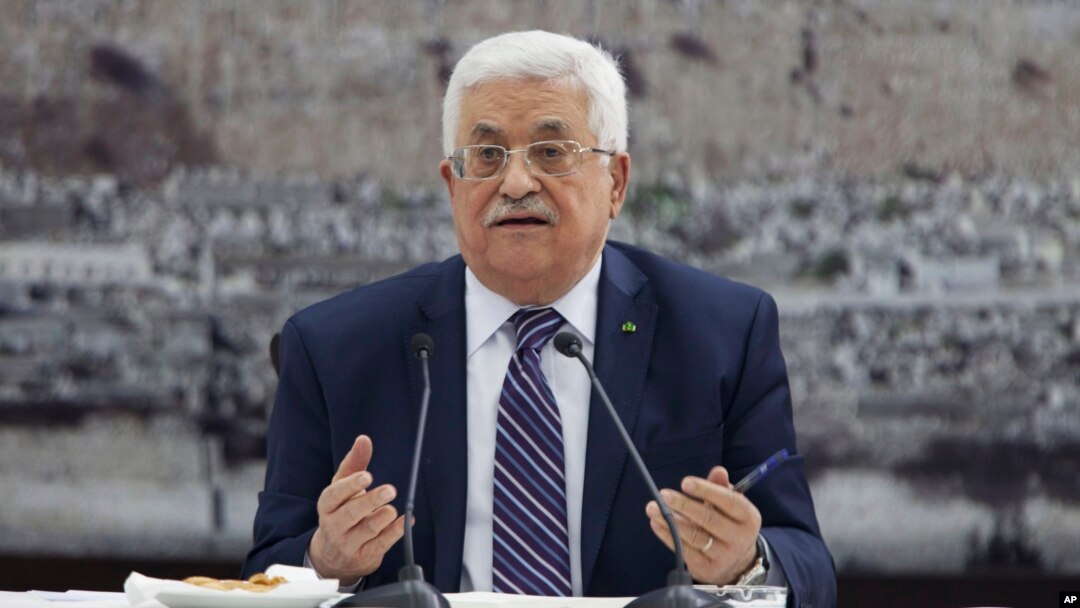BRUSSELS —
Palestinian President Mahmoud Abbas says he is resuming a bid to win more United Nations recognition, breaking an agreement that already is threatened by Israel's refusal to release more Palestinian prisoners. U.S. Secretary of State John Kerry has cancelled plans to meet with Abbas on Wednesday.
President Abbas says Palestinians are immediately restarting efforts to join 15 United Nations agencies, in a campaign that threatens U.S.-led peace talks on a two-state solution. In a televised speech from his headquarters in Ramallah, Abbas said he was compelled to take action because Israel has again refused to release more prisoners.
Abbas says Palestinians have been promised nine times that the fourth batch of prisoners would be released. He says this afternoon was the latest promise that the Israeli government would be convening to approve that. And that did not happen.
When U.S. Secretary of State John Kerry launched this peace process eight months ago, Palestinians promised to suspend United Nations applications for greater recognition in exchange for Israel agreeing to release 104 Palestinian prisoners.
The last group of prisoners was due to be set free by the end of March. But the Israeli Cabinet has repeatedly failed to approve their release.
The Palestinian move brought no immediate comment from Israel, where officials Tuesday reissued tenders for more than 700 settler homes in East Jerusalem.
Speaking at a meeting of NATO foreign ministers in Brussels, Kerry said it is "completely premature to draw any kind of judgment, certainly any final judgment" about the day's events and where things stand.
"President Abbas has given his word to me that he will keep his agreement and that he intends to negotiate through the end of April," said Kerry.
In the last week, Kerry has twice changed his schedule to return to the region, and was planning to do so again Wednesday. But he cancelled his meeting with Abbas following the Palestinian decision to go back to the U.N.
"This is a moment to be really clear-eyed and sober about this process. It is difficult. It is emotional. It requires huge decisions, some of them with great political difficulty, all of which need to come together simultaneously," said Kerry.
No issue has more consumed this secretary of state than the Israeli-Palestinian conflict. But he says it is ultimately up to the leaders themselves to make it work.
"Facilitation is only as good as the willingness of leaders to actually make decisions when they're put in front of them. And we're going to continue to do our work. We're going to continue because this matters," he said.
The Obama administration's latest approach includes offering to release a convicted Israeli spy in exchange for Israeli concessions to Palestinians, including a freeze on Israeli settlements in disputed territories and the release of additional Palestinian prisoners.
President Abbas says Palestinians are immediately restarting efforts to join 15 United Nations agencies, in a campaign that threatens U.S.-led peace talks on a two-state solution. In a televised speech from his headquarters in Ramallah, Abbas said he was compelled to take action because Israel has again refused to release more prisoners.
Abbas says Palestinians have been promised nine times that the fourth batch of prisoners would be released. He says this afternoon was the latest promise that the Israeli government would be convening to approve that. And that did not happen.
When U.S. Secretary of State John Kerry launched this peace process eight months ago, Palestinians promised to suspend United Nations applications for greater recognition in exchange for Israel agreeing to release 104 Palestinian prisoners.
The last group of prisoners was due to be set free by the end of March. But the Israeli Cabinet has repeatedly failed to approve their release.
The Palestinian move brought no immediate comment from Israel, where officials Tuesday reissued tenders for more than 700 settler homes in East Jerusalem.
Speaking at a meeting of NATO foreign ministers in Brussels, Kerry said it is "completely premature to draw any kind of judgment, certainly any final judgment" about the day's events and where things stand.
"President Abbas has given his word to me that he will keep his agreement and that he intends to negotiate through the end of April," said Kerry.
In the last week, Kerry has twice changed his schedule to return to the region, and was planning to do so again Wednesday. But he cancelled his meeting with Abbas following the Palestinian decision to go back to the U.N.
"This is a moment to be really clear-eyed and sober about this process. It is difficult. It is emotional. It requires huge decisions, some of them with great political difficulty, all of which need to come together simultaneously," said Kerry.
No issue has more consumed this secretary of state than the Israeli-Palestinian conflict. But he says it is ultimately up to the leaders themselves to make it work.
"Facilitation is only as good as the willingness of leaders to actually make decisions when they're put in front of them. And we're going to continue to do our work. We're going to continue because this matters," he said.
The Obama administration's latest approach includes offering to release a convicted Israeli spy in exchange for Israeli concessions to Palestinians, including a freeze on Israeli settlements in disputed territories and the release of additional Palestinian prisoners.


